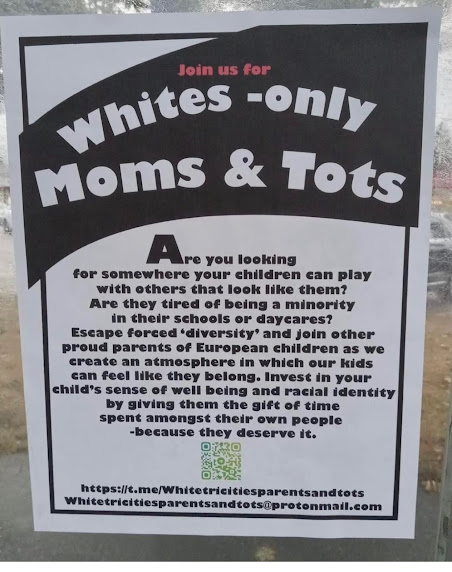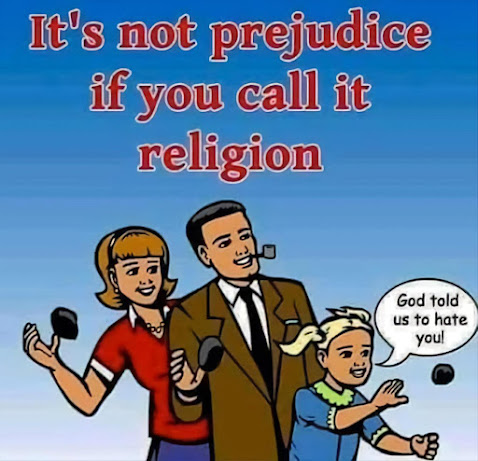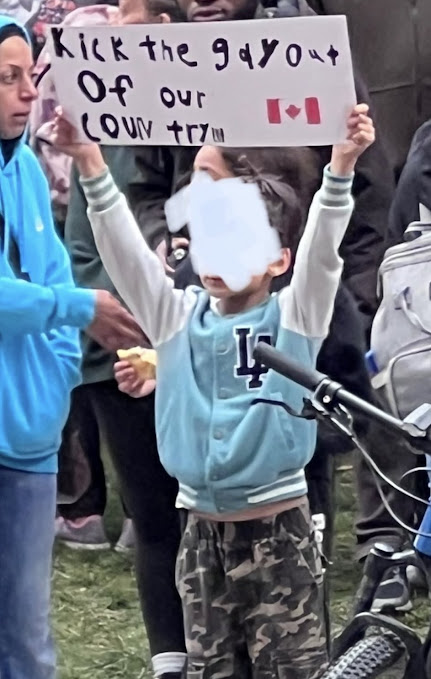On social media, my Covid posts have suddenly lost all their troll-drawing capacity. The angry mob has moved on to bombard people's 2SLGBTQIA+ posts. Just a few months ago, just mentioning the word "mask" was considered divisive and harmful to the very fabric of society. Some people wanted to get me for it. Now it's divisive to condemn hate.
This comes as no surprise. The messaging around parental rights has way more tractions as a means to divide groups, you know, like if anyone had some warped desire to form a militia of some kind. Jus' sayin'. All parents have an innate drive to protect their children from perceived harms, so that parental rights messaging really works in their favour to find more of a rabid following than masks restrict freedom ever possibly could. In this regard, the mantra of "parental rights" is pure genius!!
One of the many slogans I saw and heard in the protests last week was "LGB without the T." Some people who may have fought hard for the rights of same-sex marriage a couple decades ago are seeing the writing on the wall and clarifying "I'm not like those people" as fast as they can to stay out of the line of fire.
The protests were officially all about stopping indoctrination of children in schools as if the curriculum is the problem. I'll entertain that claim for a moment to remind people that, back when Wynne first changed the health curriculum in 2015, Campaign Life Coalition put a spin on it all, for instance referring to grade 1 lessons on "learning correct names for body parts" as "graphic lessons on sexual body parts." Talking about various families, including divorce, blended families, kids living with grandparents, as well as having parents in a same-sex marriage, was referred to as "normalizing homosexual family structures." To be fair, that's pretty accurate, but they say it like it's a bad thing. But that shouldn't be a problem, right all you LBT without the T folks??? They had pamphlets translated in a variety of languages to get new Canadians on board, telling them they wouldn't be able to maintain their religious beliefs in Ontario. Very clever. Canada sometimes has a hard time finding the optimal line between religious freedoms and equality rights.
Here's a summary of what the curriculum documents actually say at each grade level about health education. As Edward Keenan said in The Star,
"As far as I can tell--as the parent of three children attending the public school systems in Toronto--the 'indoctrination' they (and the premier of Ontario) fear is taking place in classrooms just isn't. . . . More than 70% of us recognize that trans people face a lot of discrimination, most of us think reducing that discrimination represents social progress, and most of us want to accept and help our children if we can, how we can. Of course, as I've seen from my experience reporting on U.S. politics, a loud fringe minority can reshape a lot of social and legal policy if they manage to hijack a political party. Which is why many people find it so alarming to see Conservative parties here nodding to this crowd."
Time to revisit this classic:
Because of course the hateful rhetoric has no boundaries. It's just starting with trans children.
We saw the first clear signs of real indoctrination of children at the protests a week ago.
And heard it here:
In my town, this was followed up by an incident at a local high school in which teenaged pride supporters had their flag burned and were pelted with rocks!
In Port Coquitlam, BC, this public sign doesn't beat around the bush!
 |
| Really hoped this was someone's idea of a joke, but it's real. |
"Most of the major states of history owed their existence to conquest. The conquering peoples established themselves, legally and economically, as the privileged class of the conquered country. They seized for themselves a monopoly of the land ownership. . . . Nowhere have we really overcome what Thorstein Veblen called 'the predatory phase' of human development. . . . Innumerable voices have been asserting for some time now that human society is passing through a crisis, that its stability has been gravely shattered. It is characteristic of such a situation that individuals feel indifferent or even hostile toward the group, small or large, to which they belong. . . . [In a discussion of war] my visitor, very calmly and cooly, said to me: 'Why are you so deeply opposed to the disappearance of the human race?' . . . It is the statement of a man who has striven in vain to attain an equilibrium within himself and has more or less lost hope of succeeding. It is the expression of a painful solitude and isolation from which so many people are suffering in these days."
"Human beings have made such strides in controlling the forces of nature that, with the help of these forces, they will have no difficulty in exterminating one another, down to the last man. They know this, and it is this knowledge that accounts for much of their present disquiet, unhappiness and anxiety."
"The personality that finally emerges is largely formed by the environment in which a man happens to find himself during his development, by the structure of the society in which he grows up. . . . It is evident, therefore, that the dependence of the individual upon society is a fact of nature which cannot be abolished. . . . Memory, the capacity to make new combinations, the gift of oral communication have made possible developments among human being which are not dictated by biological necessities. Such developments manifest themselves in traditions, institutions, and organizations; in literature; in scientific and engineering accomplishments; in works of art. This explains how it happens that, in a certain sense, man can influence his life through his own conduct, and that in this process conscious thinking and wanting can play a part."
"Technological and demographic developments of the last few centuries have created conditions which are here to stay. . . . An extreme division of labor and a highly-centralized productive apparatus are absolutely necessary. The time--which, looking back, seems so idyllic--is gone forever when individuals or relatively small groups could be completely self-sufficient. . . . The essence of the crisis of our time concerns the relationship of the individual to society. The individual has become more conscious than ever of his dependence upon society. But he does not experience this dependence as a positive asset . . . but rather as a threat to his natural rights. . . . His position in society is such that the egotistical drives of his make-up are constantly being accentuated, while his social drives, which are by nature weaker, progressively deteriorate. . . . They feel insecure, lonely, and deprived of the naïve, simple, and unsophisticated enjoyment of life. Man can find meaning in life, short and perilous as it is, only through devoting himself to society. . . .
The sentiment is accurate, but not the words.
We see before us a huge community of producers the members of which are unceasingly striving to deprive each other of the fruits of their collective labor--not by force, but on the whole in faithful compliance with legally established rules. . . . The result of these developments is an oligarchy of private capital the enormous power of which cannot be effectively checked even by a democratically organized political society. This is true since the members of legislative bodies are selected by political parties, largely financed or otherwise influenced by private capitalists who, for all practical purposes, separate the electorate from teh legislature. . .. . .Under existing conditions, private capitalists inevitably control, directly or indirectly, the main sources of information (press, radio, education). It is thus extremely difficult, and indeed in most cases quite impossible, for the individual citizen to come to objective conclusions and to make intelligent use of his political rights."
"Production is carried on for profit, not for use. There is no provision that all those able and willing to work will always be in a position to find employment; an 'army of unemployed' almost always exists. The worker is constantly in fear of losing his job. Since unemployed and poorly paid workers do not provide a profitable market, the production of consumers' goods is restricted, and great hardship is the consequence. Technological progress frequently results in more unemployment rather than in an easing of the burden of work for all. The profit motive, in conjunction with competition among capitalists, is responsible for an instability in the accumulation and utilization of capital which leads to increasingly severe depressions. Unlimited competition leads to a huge waste of labor, and to that crippling of the social consciousness of individuals which I mentioned before. This crippling of individuals I consider the worst evil of capitalism. Our whole educational system suffers from this evil. An exaggerated competitive attitude is inculcated into the student, who is trained to worship acquisitive success as a preparation for his future career."
"I'm sorry, but I strongly suspect that the Western world (and more) is looking down the barrel of a decade of hate, intolerance, exclusion, xenophobia, and anti-science. Somehow these qualities have become 'cool'. Perhaps our only way out is through, at the other end."
- "We ride out and meet them head on. It's the only way. This movement will burn out, eventually."
- "the other end of the tunnel is blocked by autocracy, pestilence, starvation, flooding, storms, economic collapse, and AI-generated entertainment."
- "We're kept so busy playing silly buggers with this sorry segment of the population, missing so many opportunities regarding human rights and climate change, that when the chaos ends, if it does, what'll be left? This is what the point of no return looks like."
- "Much of what we are seeing now is the expected outcome of pandemics. I've been speaking on this for a couple of decades. I expect things to get much worse soon due to inadequate healthcare workers for sickness as well as supply chain shortages."
- "Decent people had better buckle up because what's coming down the pike is going to be ugly!"







2 comments:
Thank You. Another Great post
Thanks for reading!
Post a Comment